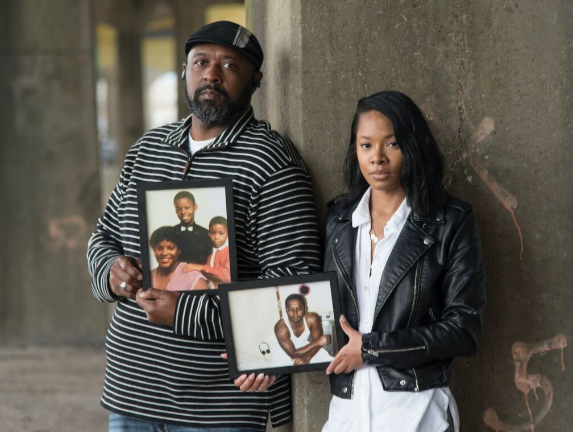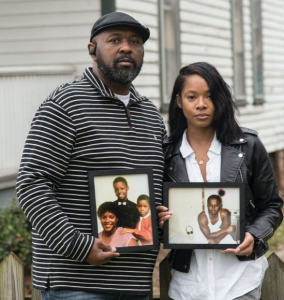
By Erica Wright
The Birmingham Times
Shanaye Poole remembered the last time she saw her father. She was about 5 years old, and her dad was wearing a nice suit. That was the day she peered through a small window as her father, ToForest Johnson, was led from a courtroom—and sent to death row.
“We were in court, and I was trying to talk to him. … ‘Daddy, you look so nice.’ He had a suit on, … and that was the day he was sentenced. … I watched my dad walk away as a free man through a small, 4-by-4 glass window,” she recalled.
Since that day Poole, now 28, along with her family and lawyers have worked to prove Johnson’s innocence.
The Case
Johnson was convicted in 1998 of murdering Jefferson County Sheriff Office Deputy William Hardy, who was working off duty as a security guard.
“If ever a case bore the hallmarks of a wrongful conviction, ToForest Johnson’s is it,” wrote attorneys for the Innocence Project, a New York City-based nonprofit that works to exonerate the innocent. “Over the course of three years, the state presented five different theories regarding who killed Deputy Hardy.”
The nonprofit filed a brief asking the court to grant Johnson a new trial based on the Brady doctrine and numerous other problems with Johnson’s conviction. The Brady doctrine is a court precedent that establishes that prosecutors must turn over all evidence that might exonerate a defendant, including any evidence that goes to the credibility of a witness.
In a Feb. 7, 2020, opinion article that appeared on AL.com, Richard Jaffe, a Birmingham-based lawyer familiar with the case, wrote, “In Mr. Johnson’s case, it wasn’t disclosed until decades after his conviction—just last year—that the prosecution’s key witness was paid $5,000 for her testimony. That witness was an ‘earwitness,’ who claimed she overheard someone who called himself ‘Toforest’ confess to the crime on a phone call. But that witness had never met Mr. Johnson and had never even heard his voice. Even more concerning is that the story that witness said she overheard contradicted the evidence at the scene of the shooting.”
A Sept. 5, 2019, opinion essay in The Washington Post described Johnson’s trial rife with problems and also a witness who received $5,000 from the state to testify against Johnson, a fact that wasn’t made known to defense attorneys at the time.
“Tough Through the Years”

Poole said she is pained by the hallmarks of her father’s wrongful conviction, not only by what happened in court.
“It’s tough because you miss time with your father, you miss time with your family, some of the life lessons are stripped away from you prematurely—and it’s not just me: I have other siblings that feel the same,” she said. “[My father] has grandchildren he hasn’t seen aside from pictures we can send to him. It’s been tough through the years. … I was confused as a child because I just didn’t understand, because we’re taught that justice serves us all.”
She continued, “Although [my father] hasn’t been here in the flesh, he’s really been here in spirit. He’s never missed a birthday. He’s never not sent a Christmas card. … I have a box full of cards [I’ve saved] since I was a little girl. … It has been especially tough for my siblings and me, but my father is not a complainer. … He’s strong for us all.”
Johnson, who is on death row at the Holman Correctional Facility, near Atmore, Ala., has a team of pro bono attorneys from the Southern Center for Human Rights in Atlanta, Ga., and University of California Berkeley School of Law. Attorney Ty Alper, who has worked on Johnson’s appeals since 2002, has argued that in a death penalty case with only one witness, the jury should know that witness was paid $5,000 for her testimony and was motivated to come forward to get the money.
“All we are asking for is a fair trial for Mr. Johnson in front of a jury that hears all the evidence,” Alper has said.
Johnson’s family now awaits a decision by Jefferson County Circuit Court Judge Teresa Pulliam, who ruled over a hearing last summer during which Johnson’s attorneys argued that he deserves a new trial because of the prosecution’s failure to disclose at the first trial that the witness would be paid reward money. Pulliam is expected to rule by March 16.
Long-Awaited Justice
Poole, who graduated from the University of Alabama in 2014 and works as a pharmaceutical representative has three brothers and a sister. All of Johnson’s family members, including uncles and aunts, are hoping for long-awaited justice.
One family member who has followed the case from the beginning, including through a pair of trials, is Johnson’s first cousin Tony Green.
“I never have seen any evidence [in this case] that would cost a person his life or his freedom,” said Green. “It’s never been there. They’ve never presented it. It’s always been a hearsay type of statement. … Other than the fact that this is my loved one who I’m very close to, it could have just as well been me or anybody else they could’ve linked to this case. … There is no evidence, no witnesses, nothing that would actually put [Johnson] at the place this crime occurred.”
Hardy was killed in 1995. He had worked as a deputy for 23 years but held another job as a security guard to bring in more money for his family. On the night of July 19, 1995, he was working security at the Crown Sterling Suites Hotel in Birmingham, and sometime between midnight and 1 a.m., he was shot in the head execution-style in the hotel parking lot. There were no eyewitnesses to the crime, and no weapon was ever recovered.
Johnson and a friend, Ardragus Ford, were both charged and tried twice for Hardy’s murder. The first two trials ended in mistrials, when the juries could not reach a verdict. In Ford’s second trial, the jury acquitted him of all charges. In Johnson’s second trial, he was convicted and sentenced to death.
Green said he noticed a difference between Johnson’s two trials: “Most of the witnesses who testified in the favor of my cousin in the first trial were no longer there [during the second]. People who said he was at a totally different location during the time this crime was being committed were no longer there or not able to be found, for whatever reason.”
Green also recalls what it was like for him when Johnson was found guilty.
“During his sentencing, I had to do what could very well be one of the hardest things I’ve ever done in my life—get on the stand and plead for [my cousin’s] life,” he said. “This was a capital case, and the death penalty was on the table, but with the lack of evidence, in my mind, I never thought that was a possibility. That was one of the hardest things [I’ve ever had to do] because I love my cousin, we grew up together, there’s only two or three years difference between us in age. … We were very close, and I found myself trying to convince [the court] not to kill him. The state had not proven that he had committed this crime. … To kill him would be adding on to the injustice that had already been done.”
Still, Green said he “strongly believes” in the judicial system.
“I feel they have an opportunity to make an extreme wrong right,” he said. “We can’t get the time back [that Johnson has been in jail], and we realize that, but they can do as much as they can to make this situation right by granting his freedom.”
“Just Mercy”
Poole was stirred emotionally by the film “Just Mercy,” released on Christmas Day 2019, which Jaffe, describes in his recent AL.com opinion piece, as a movie that “shines a spotlight on the problems with Alabama’s death penalty [by telling] the true story of Walter McMillian, a black man released from prison after spending six years on Alabama’s death row for a crime he did not commit.” McMillian’s story depicts “how prosecutors can rely on flimsy evidence when under pressure to solve a high-profile crime, [as well as the difficulties of getting] a court to really look at a case after a person is convicted,” Jaffe wrote. McMillian, played in the film by Academy Award—winning actor Jamie Foxx, was finally freed from death row in 1993.
“When I was in the movie theater, it was almost too close to home. I remember having to take a moment and take a breath,” Poole said. “[The case in the film] was built off the statement of one witness, and that was ultimately all that they had in [McMillan’s] conviction. … So many families go through the same things that my father is going through, and the movie resembled [our family’s situation]. … I remember one of the lines in the movie: I believe his daughter said, ‘When my father went away, it’s like we’re all on death row.’ I think my family feels the same way. We’ve gone a very long time without my dad being present, … [but] I do have faith that justice will prevail.”
Updated on 2/22/20 at 8:32 p.m. to correct year of Johnson’s conviction.




